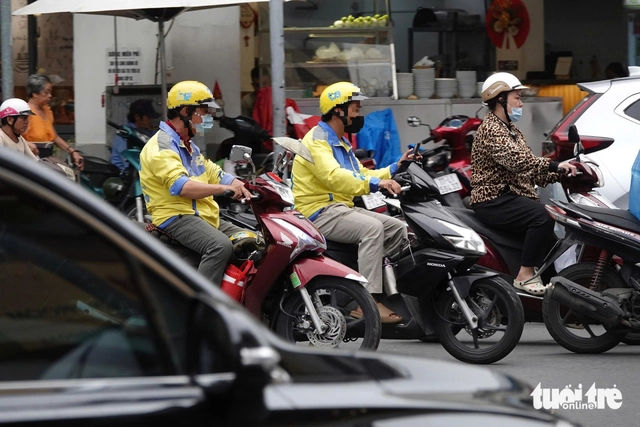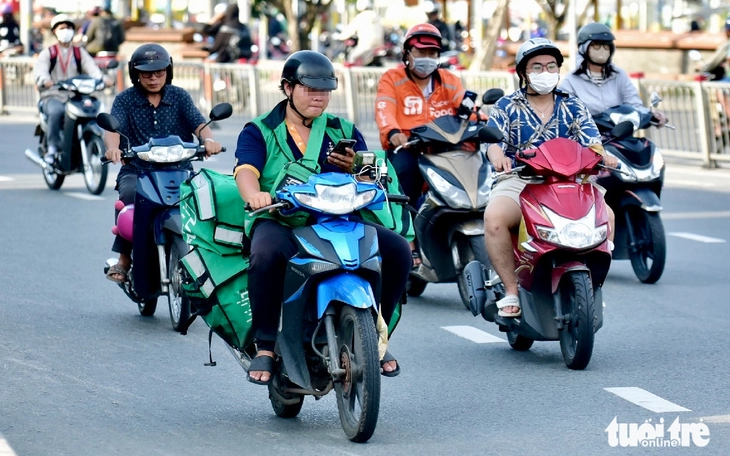
Ho Chi Minh City proposes a full electric motorbike transition for app-based delivery and ride-hailing drivers by 2029. Photo: T.T.D. / Tuoi Tre
The draft proposal, developed by the Ho Chi Minh City Institute for Development Studies (HIDS), is part of a broader emissions control initiative led by the municipal Department of Construction.
The Department of Construction is a merger between the transport department and the construction department, as part of a nationwide administrative restructuring drive.
The city’s administration is expected to review the plan within this month, with support policies set to begin on January 1, 2026, if approved, Le Thanh Hai, director of the Center for Economic Application Consulting under HIDS, said at a press briefing on Thursday.
According to HIDS, Ho Chi Minh City has approximately 400,000 ride-hailing and delivery drivers, with each traveling an average of 80-120 kilometers per day—three to four times more than the average citizen.
This high daily mileage makes them a key target group for the city’s green transition goals.
The plan aims to eliminate 100 percent of emissions from this category by transitioning all of their gasoline motorbikes to electric ones by 2029.
The roadmap outlines a four-phase transition process.
By December 2025, 30 percent of the drivers, or roughly 120,000, are expected to switch to electric vehicles.
The goal increases to 50 percent by December 2026, 80 percent by December 2027, and reaches full conversion by the end of 2029.
A range of policies will be introduced to support this transition.
Starting in January 2026, the city will stop registering new contracts for gasoline-powered motorbikes used in ride-hailing services, according to the draft proposal.
Drivers who signed contracts before that date can continue operating, but must have a plan to transition.
From 2027, gasoline-powered motorbikes will be restricted during peak hours in designated low-emission zones.
By 2028, emissions inspections will be tightened, and from December 2029, gasoline-powered bikes will be completely banned from app-based ride and delivery services.

Le Thanh Hai, director of the Center for Economic Application Consulting under the Ho Chi Minh City Institute for Development Studies, addresses a press briefing in Ho Chi Minh City, July 17, 2025. Photo: Chau Tuan / Tuoi Tre
The proposal includes a wide range of incentives.
These include two-percent interest subsidies for green loans, credit guarantees for drivers, legal support to minimize banking risks, and VAT refunds per trip for those using electric bikes.
It also recommends exempting electric bikes from registration fees, VAT, and license plate fees for two years beginning January 2026.
To ensure that no group is left behind, the plan allocates funding to support 10,000 low-income drivers with subsidies of VND8 million (US$305) per vehicle.
Drivers can pay the remaining cost in installments over 24 to 30 months, supported by savings from reduced fuel expenses.
The proposal also encourages partnerships between EV manufacturers, banks, and ride-hailing platforms to create affordable financing products.
Besides, infrastructure development is a critical part of the plan.
HIDS has begun working with relevant agencies to ensure the city’s electrical grid can handle increased EV demand.
Most drivers charge their vehicles at night, easing daytime load concerns, but long-term upgrades will be necessary as demand grows.
Additional efforts will support the expansion of EV charging stations, rest stops, and battery swapping infrastructure.
To address public concerns about EV safety, Hai clarified that most recent EV-related fires were caused by faulty household wiring, not the vehicles or chargers.
The draft proposes that local authorities inspect and upgrade electrical infrastructure in boarding houses and high-density residential areas to ensure safe charging conditions.
Hai emphasized that the EV transition is “an irreversible trend” and called for cooperation from drivers, companies, and the public.




Max: 1500 characters
There are no comments yet. Be the first to comment.